9年级英语一课一练
九年级英语一课一练答案

Unit oneP21-8pronuciation aloud specific hard frustrated improve differently memorize1-5 BCDDA1-8To about with for in with by inP39-10 about by1=8 easy, to understand, excited, unhappy written playing practicing frustrating1-6 BACBDB1-5 studying with a group sound the same take some grammar notes practice English ended up being friends1-6 what about making helps it by studying too to improve by reading where to get1-6 had fun at all ask for end up a little get excitedP41-6 CCBADB1-3 first of all makes mistakes begins withP54-9 look up take notes laugh at make up be afraid to later onDAGFCCCAA1 CP62-6ABDBALater on listening practice laugh at make up the group use grammar to make sentences memorizing the words of English songs1-10 taking get quickly but laugh unhappy better angry what afraid1 CP72-3 CD1-8 Reading eating development excited frustrating sleepingWent by broke off with the help of regards as try our best compare to worry about complained about1-7 BCABDDBP8ACBACADCP91-8 Easily friendship lose solve best influence unless regard1-6 CDBADB1-4 ACDBP111-6 DCBDBB1-8 terrified more outgoing seeing didn’t know work interested being to keep1-6 have short hair on the school basketball team did use to Be sure to with his eyes open has changed a lot1-3 DAGP124-5CE1-8 airplane sleep team quiet serious change differently straight1-8 terrified staying at home alone keep on used to walk ended up cooking hanging out frustrating by listening to tapes spent on is interested in1-6 about/on on the desk with in his hand be afraid of get used to meeting her outgoing friendly to1-5 BEACDP 131-6 DBCDBB1-9 go to seep have to mind worry about used to be afraid of daily so much hardly ever1-5 gym class paint pictures walk to spending all day chewing gumP146-8 to wash your hands more outgoing with the help of1-4 ADAD1-6 DDBDAD1-6 on foot spent flying on team no more instead of it seems that1-2 did use to be yes, I did what did useP153-5 didn’t use to used to enjoy didn’t he1-10 fly never traveling off when keep board what police nothing1-6 DDDCBC1-5 doesn’t anymore seems to dislike used to be on makes me very relaxed in the past ten years1-2 BA3-15 CCD BADCB BBADC1-4 CABBP171-8 Waste decision patient caused himself surprise afford necessary1-10 give up gets into trouble even though take pride in make a decision to our surprise in the end pay attention to any longer all the time1-5 FECDBP191-6 BDDCAA1-8 should be allowed sill y get their ears pierced instead of so do we stay up late right decision agree with1-9 DIAGFBEHC1-8 pierced be planted to rain to put on disagree 16-year-olds buying to hold1-2 ABP203-6DABA1-6 crying be changed build going on two-week1-6 be allowed a twelve-year-old girl not old enough to instead of so does my brother it seems that have1-5 DGAECP211-8 present opportunity member designed experience local volunteer probably1-6 ADCCDB1-8 worry about fail the test get to class take the test quiet strict with us wear uniforms the other day stay upP221-15 CADBC CADBB ABDAB1-6 CAACAB1-6 concentrates on the other day passed the test instead of get noisy a great experience1-3 be allowed to replied to spend this weekend4-8 doesn’t seem to have achieve your dreams watching tv too much have a day off have an opportunity to go1-4 CADB1-8 keeping more comfortable doing be allowed to reply volunteering made sleepy1=5 should be allowed shouldn’t be allowed don’t should be done should be cleaned trees are planted1-2 FDP243-5 AGC1-4 comfortable athletes achieve raceP255-6 importance obey1-8 succeed designed local perform realistic points experience building1-10 another wear order heads agreement change clean difficult if allowed 1-5 CEGAD。
外研版九年级英语上册 Module 5 Museums 一课一练(基础)(含答案)
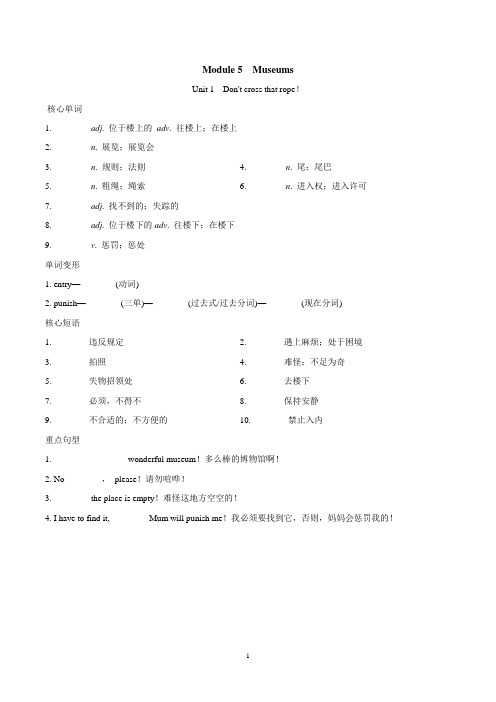
Module 5MuseumsUnit 1Don't cross that rope!核心单词1. ________ adj. 位于楼上的adv. 往楼上;在楼上2. ________ n. 展览;展览会3. ________ n. 规则;法则4. ________ n. 尾;尾巴5. ________ n. 粗绳;绳索6. ________ n. 进入权;进入许可7. ________ adj. 找不到的;失踪的8. ________ adj. 位于楼下的adv. 往楼下;在楼下9. ________ v. 惩罚;惩处单词变形1. entry—________(动词)2. punish—________(三单)—________(过去式/过去分词)—________(现在分词)核心短语1. ________违反规定2. ________遇上麻烦;处于困境3. ________拍照4. ________难怪;不足为奇5. ________失物招领处6. ________去楼下7. ________必须,不得不8. ________保持安静9. ________不合适的;不方便的10. ________禁止入内重点句型1. ________ ________ wonderful museum!多么棒的博物馆啊!2. No ________,please!请勿喧哗!3. ________ the place is empty!难怪这地方空空的!4. I have to find it, ________ Mum will punish me!我必须要找到它,否则,妈妈会惩罚我的!Unit 2If you ever go to London,make sure you visit the Science Museum.核心单词1. ________n. 物理学2. ________ n. 实验3. ________ n. 沙;沙子4. ________ v. 操作;操纵5. ________ n. 卡车;货车6. ________ n. 轮子;车轮7. ________ n. (复数) 通信8. ________ n. 化学9. ________ n. X射线;X光10. ________ v. 挖掘;掘(洞)11. ________ n. 煤12. ________ n. 能量;能源13. ________ adj. 全部的;整个的单词变形1. wheel—________(复数)2. control—________(三单)—________(过去式/过去分词)—________(现在分词)3. dig—________(三单)—________(过去式/过去分词)—________(现在分词)核心短语1. ________ 物理实验2. ________ 把……用……装满3. ________ 弄清楚4. ________ 比较……与……5. ________ 所有年龄段的6. ________ 查明;确保7. ________ 成千上万的8. ________ 制造噪音重点句型1. For example, you can ________ ________ how people dig coal from the ground and use it to create energy.例如,你能弄清人们怎样从地下挖煤,并用它产生能量。
牛津译林版九年级英语上册 Unit 5 Art world 一课一练(基础)(含答案)

Unit 5Art worldComic strip & Welcome to the unit核心单词____________________n. (=pop music)流行音乐单词变形1. music—____________________(形容词)2. pleasant—____________________(比较级)—____________________(最高级)核心短语1. ____________________热爱艺术2. ____________________令人愉快的事3. ____________________艺术形式4. ____________________一个艺术节5. ____________________音乐天赋重点句型1. Because I've found ____________________ art.因为我找到了比艺术更令人愉快的东西。
2. What ____________________ do you like?你喜欢什么艺术形式?3. —What kind of music do you ____________________?—I prefer pop music.——你最喜欢哪种音乐?——我更喜欢流行音乐。
4. Because he was the King of Pop. His ____________________ was amazing.因为他是流行音乐之王。
他的音乐天赋太棒了。
Reading核心单词1. ____________________vt. 颁发;提交2. ____________________n. 乐器;工具;器械3. ____________________adj. 普通的,一般的,常见的4. ____________________n. 物品,东西5. ____________________n. 石头6. ____________________vt. 控制,支配7. ____________________n. 钟,铃8. ____________________conj. 虽然,尽管单词变形1. present—____________________(过去分词)2. centre—____________________(形容词)3. music—____________________(名词)4. win—____________________(动词的-ing形式)____________________(名词)5. successful—____________________(副词)6. tradition—____________________(形容词)7. west—____________________(形容词)8. boundary—____________________(复数)核心短语1. ____________________音乐无国界2. ____________________被颁发给某人3. ____________________一个世界闻名的作曲家4. ____________________在湖南中部5. ____________________对某事有兴趣6. ____________________乐器7. ____________________继续做某事8. ____________________用普通东西创作音乐9. ____________________慢慢了解10. ____________________因……而闻名11. ____________________通过控制……的速度12. ____________________水流13. ____________________一个古老的中国编钟14. ____________________混合到一起15. ____________________用一种西方的风格16. ____________________形成一个新的类型17. ____________________最伟大的作曲家之一18. ____________________在他的作品中19. ____________________为……作曲重点句型1. He loves ____________________ and the blowing wind because, to him, the best music ____________________.他喜欢流水的声音和风的吹拂,因为对他来说,最好的音乐来自大自然。
人教新目标九年级初三英语Unit6一课一练习(含答案)
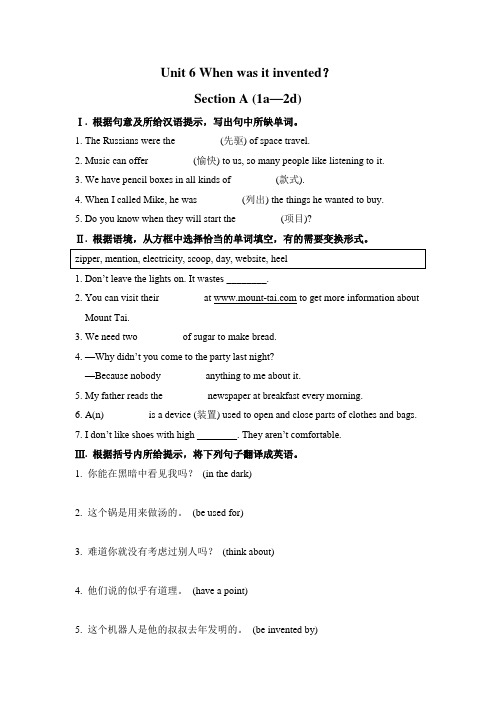
Unit 6 When was it invented?Section A (1a—2d)Ⅰ. 根据句意及所给汉语提示,写出句中所缺单词。
1. The Russians were the ________ (先驱) of space travel.2. Music can offer ________ (愉快) to us, so many people like listening to it.3. We have pencil boxes in all kinds of ________ (款式).4. When I called Mike, he was ________ (列出) the things he wanted to buy.5. Do you know when they will start the ________ (项目)?Ⅱ. 根据语境,从方框中选择恰当的单词填空,有的需要变换形式。
1. Don’t leave the lights on. It wastes ________.2. You can visit their ________ at to get more information about Mount Tai.3. We need two ________ of sugar to make bread.4. —Why didn’t you come to the party last night?—Because nobody ________ anything to me about it.5. My father reads the ________ newspaper at breakfast every morning.6. A(n) ________ is a device (装置) used to open and close parts of clothes and bags.7. I don’t like shoes with high ________. They aren’t comfortable.Ⅲ. 根据括号内所给提示,将下列句子翻译成英语。
【人教新目标】九年级英语:全册一课一练(含答案) Section B (1a—2b)
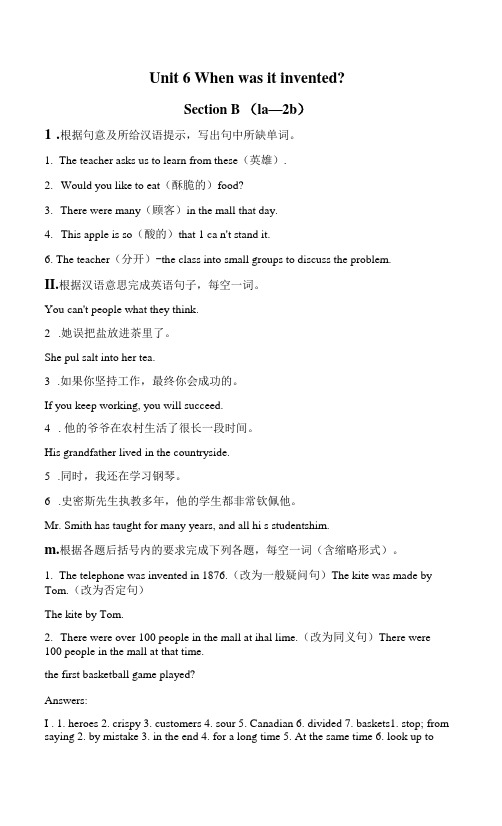
Unit 6 When was it invented?Section B (la—2b)1.根据句意及所给汉语提示,写出句中所缺单词。
1.The teacher asks us to learn from these(英雄).2.Would you like to eat(酥脆的)food?3.There were many(顾客)in the mall that day.4.This apple is so(酸的)that 1 ca n't stand it.6. The teacher(分开)-the class into small groups to discuss the problem.II.根据汉语意思完成英语句子,每空一词。
You can't people what they think.2.她误把盐放进茶里了。
She pul salt into her tea.3.如果你坚持工作,最终你会成功的。
If you keep working, you will succeed.4.他的爷爷在农村生活了很长一段时间。
His grandfather lived in the countryside.5.同时,我还在学习钢琴。
6.史密斯先生执教多年,他的学生都非常钦佩他。
Mr. Smith has taught for many years, and all hi s studentshim.m.根据各题后括号内的要求完成下列各题,每空一词(含缩略形式)。
1.The telephone was invented in 1876.(改为一般疑问句)The kite was made by Tom.(改为否定句)The kite by Tom.2.There were over 100 people in the mall at ihal lime.(改为同义句)There were 100 people in the mall at that time.the first basketball game played?Answers:I . 1. heroes 2. crispy 3. customers 4. sour 5. Canadian 6. divided 7. baskets1. stop; from saying 2. by mistake 3. in the end 4. for a long time 5. At the same time 6. look up toII. 1. Was; invented 2. wasn't made 3. more than 4. When was。
冀教版九年级英语上册 UNIT 2 Great People 一课一练(基础)(含答案)
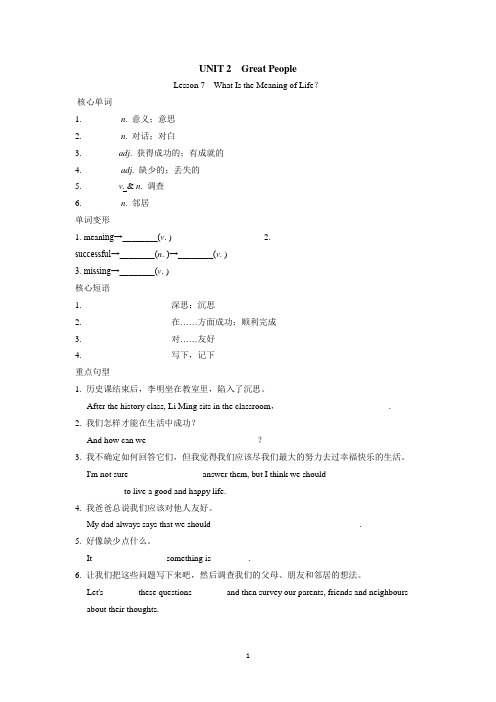
UNIT 2Great PeopleLesson 7What Is the Meaning of Life?核心单词1. ________ n. 意义;意思2. ________ n. 对话;对白3. ________adj. 获得成功的;有成就的4. ________ adj. 缺少的;丢失的5. ________v. & n. 调查6. ________ n. 邻居单词变形1. mean ing→________(v. )2.successful→________(n. )→________(v. )3. missing→________(v. )核心短语1. ____________________深思;沉思2. ____________________在……方面成功;顺利完成3. ____________________对……友好4. ____________________写下,记下重点句型1. 历史课结束后,李明坐在教室里,陷入了沉思。
After the history class, Li Ming sits in the classroom,________ ________ ________.2. 我们怎样才能在生活中成功?And how can we ________ ________ ________?3. 我不确定如何回答它们,但我觉得我们应该尽我们最大的努力去过幸福快乐的生活。
I'm not sure ________ ________answer them, but I think we should ________ ________ ________ to live a good and happy life.4. 我爸爸总说我们应该对他人友好。
My dad always says that we should ________ ________ ________ ________.5. 好像缺少点什么。
外研版九年级英语上册 Module 7 Great books 一课一练(基础)(含答案)
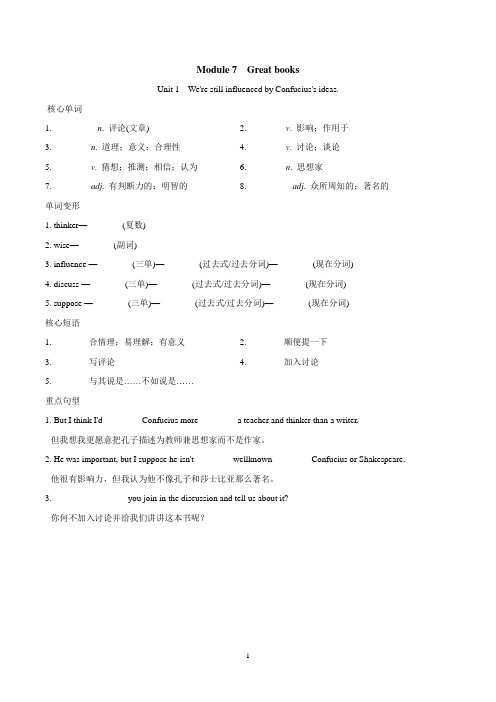
Module 7Great booksUnit 1We're still influenced by Confucius's ideas.核心单词1. ________ n. 评论(文章)2. ________ v. 影响;作用于3. ________ n. 道理;意义;合理性4. ________ v. 讨论;谈论5. ________ v. 猜想;推测;相信;认为6. ________ n. 思想家7. ________ adj. 有判断力的;明智的8. ________ adj. 众所周知的;著名的单词变形1. thinker—________(复数)2. wise—________(副词)3. influence —________(三单)—________(过去式/过去分词)—________(现在分词)4. discuss —________(三单)—________(过去式/过去分词)—________(现在分词)5. suppose —________(三单)—________(过去式/过去分词)—________(现在分词)核心短语1. ________合情理;易理解;有意义2. ________顺便提一下3. ________写评论4. ________加入讨论5. ________与其说是……不如说是……重点句型1. But I think I'd ________ Confucius more ________ a teacher and thinker than a writer.但我想我更愿意把孔子描述为教师兼思想家而不是作家。
2. He was important, but I suppose he isn't ________ wellknown ________ Confucius or Shakespeare. 他很有影响力,但我认为他不像孔子和莎士比亚那么著名。
九年级英语一课一练听力材料

九年级英语一课一练听力材料以下是一份九年级英语一课一练的听力材料,题目编号与原文顺序一致:听力材料(题目1)听录音,选择正确的答案。
题目:What is the topic of the passage?录音:The topic of this passage is about the differences between high school and college.答案:A(题目2)Listen carefully and fill in the blanks.录音:The student should study harder in high school than in college because ______.答案:the standards are higher in high school.(题目3)Listen carefully and answer the question.录音:Do you think high school students should have more freedom than college students?答案:No, I don't think so. High school students need to learn more discipline and structure.听力材料续篇(题目4)Read the passage and answer the question.Question: What are the differences between high school and college?Answer: The main difference between high school and college is that students in college are usually more independent and have more freedom to choose their own classes and schedule, but high school students need to follow a more structured curriculum and adhere to a strict schedule.(题目5)Listen carefully and choose the correct word from the options.录音:In high school, students usually ______ more homework thanin college.答案:do听力材料续篇续篇(题目6)Listen carefully and fill in the blanks.录音:The main reason why high school students need to study harder is that ______.答案:the standards are higher in high school.(题目7)Answer the question after listening to the tape.Question: Do you think high school students should be more responsible for their own learning?Answer: Yes, I think so. High school students need to take more responsibility for their own learning because they are responsible for their own future success or failure.以上是一份九年级英语一课一练的听力材料,涵盖了听力选择、填空、回答问题和阅读理解等多种题型,旨在帮助学生提高英语听力和阅读理解能力。
- 1、下载文档前请自行甄别文档内容的完整性,平台不提供额外的编辑、内容补充、找答案等附加服务。
- 2、"仅部分预览"的文档,不可在线预览部分如存在完整性等问题,可反馈申请退款(可完整预览的文档不适用该条件!)。
- 3、如文档侵犯您的权益,请联系客服反馈,我们会尽快为您处理(人工客服工作时间:9:00-18:30)。
一、单项选择1. Does he a bus ____?A.take ;homeB.taking; homeC.take;to homeD.taking;to home2.____ you play chess well ?A. DoB.IsC.DoesD. Are3. There are lots of to do every day .A. thingsB. homeworkC. newsD. maths4. Do you often tell a bout your everyday life?A. his B he C. her D.they5. She wants an orange.A to eat B. eating C. eat D. eats6.1 often take a bus to school, but I go to school by bike.A. some timeB. sometimeC. some ttimesD. sometimes7. We always after school.A. go to schoolB. go homeC. to go homeD. to go to school8. Mike his homework in the eveningA. Do; doB. Do; does C .Does ;do D.Does ;/9. Dick never eats vegetables, so this is not a life.A. happyB. healthyC.interestingD. sad10. We home at 6:00 pm every day.A. goB. goC. goesD. goes to11. Xiaodong goes to school by bike (骑自行车). She walks to school.A. alwaysB. oftenC. sometimesD. never12.I____at ten o'clock in the evening.A. have breakfastB. get upC. go to bedD. watch morning TV13. I go home __ __5:30 the afternoon.A.at;onB.at;inC.at ;atD.in;/14.It's ten o'clock.I must go .A.to homeB. homeC. my homeD. his home15. He his homework on Sundays.A doesn,t B. don't do " C. doesn't do D. don't二、完形填空Nancy is reading an e-mail from he rfriend Jack. Sheis very 16 to get the e-mail. Jack writes about his school 17 his weekends. Jack likes his school very much. Nancy li kes her school, 18 . Jack’s school is very big and he likes his classroom. The 19 and chairs are new. There are lots of pictures 20 the wall. They clean the classroom every day.Jack doesn’t 21 to school at the weekend. He gets up 22 at six on Satur day .He exercises in the park for half 23 . Then he eats his breakfast. He helps his mother do the 24 . At eight he begins to do his homework. He has lunch in a fast food restaurant(快餐店 ). In the 25, he goes shopping with his mum. Sometimes he plays computer games or chats with his friends on the Internet. He enjoys his weekend very much.16. A. tall B. well C. happy D. good17. A. but B. and C. or D. at18. A. also B. again C.too D. either19. A. desks B. schoolbags C. pencils D. boys20. A. at B. on C. near D. behind21. A.like B. play C. go D. Have22. A. early te C. before D. here23. A. a year B. a month C. an hour D week24. A. homework B. cleaning C. fishing D. lessons25. A. day B. evening C. afternoon D. week三、阅读理解AMiss Li is a teacher. She teaches in a middle school. She gets up at half past five in the morning. She has breakfast at 6:00.After that she goes to school by bike. She gets there very early. She cleanst he desks and chairs for other teachers. Classes begin at 8:00.She and the other teachers work hard. She goes home at 4:00 in the afternoon. Then she does some housework .After dinner she reads books and goes over the students’ homework. She goes to bed at about ten.26. Miss Li worksA. in a shopB. in a middle schoolC. on farmD. in a factory '27.She get up at in the morning..A. 5:l0B.5:20C.5:30D.5:4528. She goes to workA .lateB at night C. early D. on foot29. She does some houseworkA. at 4:30B. before 4:40C. after 4:00D.in the morning30. After supper she____.A reads books B. goes overthe students 'homeworkC both A and B D. watches TVBJenny gets up early in the morning. She has her breakfast and then goes to school. She walks to the bus stop and takes a bus, She gets to school at about half past seven. Jenny is never late for school. She likes her school and works hard. Classes begin at8:00. She has six classes every day. Jenny is good at all her lessons, and she likes English best.Usually Jenny has lunch at school. She goes home at five in the afternoon. Sometimes, she helps her friends with their lessons. After supper she usually watches TV news. Then she does her homework. She goes to bed at about 9:30. Jenny is a good girL31. Where does Jenny have her breakfast?A. She has her breakfast at home.B. She has her breakfast at school.C. She has her breakfast on her way to school.D. She has her breakfast on the bus.32. How does Jenny do in herlessons?A. She doesn't like going to school.B. She can’t do her lessons.C. She does very well in her lessonsD.She doesn’t know her lessons at all.33. How many hours is Jenny at school?A. She is at school for seven hours.B. She is at school for seven and a half hours.C. She is at school for eight hours.D. She is at school for nine and a half hours.34. What does Jenny sometimes do after school?A. She has supper with her classmates at schoolB. She helps her friends with her lessons.C. She does some shopping for her mother.D. She goes home with her friends.35. What does Jenny do after supper?A. She watches TV and then goes to bed.B. She watches TV and does some housework.C. She watches TV and does her homework.D. She reads her English and does some sports.四、词汇。
